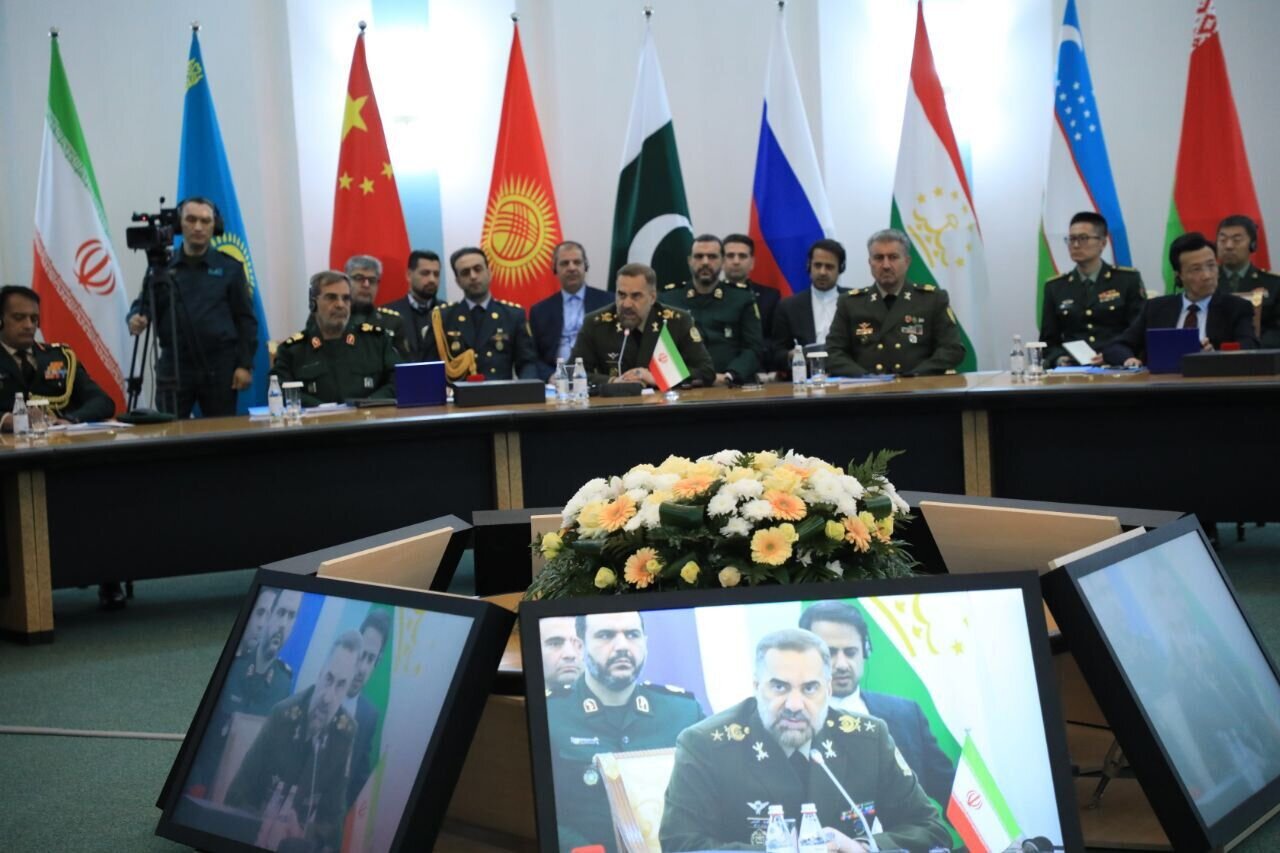Iran's agenda at SCO: peace, stability, and security

TEHRAN- The Iranian Defense Minister has delivered a resounding message of "peace, stability, and security" during the 21st meeting of the Council of Defense Ministers of Member States of the Shanghai Cooperation Organization (SCO) in Astana, Kazakhstan.
Emphasizing these core principles as integral to Iran's defense and security doctrine, Brigadier General Mohammad Reza Ashtiani underscored the nation's commitment to fostering a climate of tranquility both within the region and globally.
In his address, General Ashtiani firmly stated Iran's stance against the pursuit of "war and tension" in the region, affirming a dedication to peaceful coexistence among neighboring countries and beyond.
He highlighted the imperative of combating terrorism within the SCO's geographical scope, emphasizing the necessity of upholding trust, fostering friendship, and promoting good neighborliness among member states.
The Iranian Defense Minister's remarks encapsulated Iran's proactive role in advocating for collective security measures within the SCO framework, signaling a commitment to collaborative efforts aimed at safeguarding regional stability and enhancing global security.
Islamic Republic’s firm stance: no appetite for war or regional tension
In the condemnation of the Zionist regime's actions, General Ashtiani affirmed the Palestinian nation's right to legitimate defense while decrying the egregious acts of violence and state terrorism perpetrated by the regime and its supporters.
Highlighting recent provocations aimed at escalating regional tensions and diverting attention from the Zionist regime's atrocities in Gaza, the Iranian defense minister denounced the brazen attack on Iran's consulate in Syria as a clear violation of international law, specifically Article 31 of the Vienna Convention.
General Ashtiani lamented the tragic loss of Iranian military advisers in the attack, emphasizing that their presence in Damascus was at the invitation of the Syrian government.
He underscored Iran's response, characterized as a measured warning intended to deter further aggression while minimizing the risk of escalation.
Stressing Iran's commitment to peace and stability in the region, he reiterated that the Islamic Republic has no desire for war or heightened tensions, citing the nation's adherence to the principles of the United Nations Charter, particularly Article 51 regarding the right to legitimate defense.
Iran's resounding call: peace, stability, friendship, and security
General Ashtiani highlighted the significance of joint naval exercises between Iran, Russia, China, and other members of the Shanghai Cooperation Organization (SCO), envisioning the establishment of a maritime security belt to safeguard the Indian Ocean as a crucial global trade route.
General Ashtiani's remarks underscored the strategic importance of leveraging SCO resources to bolster defense and military cooperation among member states, fostering confidence and stability in the region.
General Ashtiani commended the principled stance of SCO member states in condemning terrorist attacks, particularly the recent assault on Iran's diplomatic premises in Syria by the Israeli regime.
He lauded the support of Russia and China during a Security Council meeting on April 14, where they affirmed Iran's right to legitimate defense.
The Defense Minister's remarks came during his two-day visit to Astana, Kazakhstan, for the SCO defense ministers' meeting.
This gathering saw unanimous denouncement of recent terrorist acts in Russia, Syria, Pakistan, and the Zionist regime's assault on the Iranian consulate in Damascus on April 1.
The defense ministers expressed solidarity with the victims' families and voiced concern over the escalating threat of international terrorism, emphasizing the need for enhanced defense cooperation among SCO member states.
Bilateral meetings
On the sidelines of the meeting, General Ashtiani engaged in discussions with defense ministers from China, Russia, and Belarus, fostering diplomatic relations and addressing pressing regional issues.
In a notable exchange with Russian Defense Minister General Sergei Shoigu, General Ashtiani underscored Iran's right to legitimate defense in response to actions by the Zionist regime.
The meeting between the defense ministers of Iran and Kazakhstan saw General Ruslan Zhaksylykov extend congratulations to his Iranian counterpart on Iran's full membership in the organization. He expressed optimism that Iran's participation would bolster the organization's plans and objectives.
In a separate meeting with Chinese Defense Minister Dong Jun, General Ashtiani acknowledged China's supportive stance on regional developments, particularly condemning the Zionist regime's attack on Iran's consulate. He attributed recent tensions in the region and the dire situation in Gaza to destabilizing actions by the United States and support for the Zionist regime's atrocities.
The Chinese defense minister echoed these sentiments, condemning the Israeli regime's terrorist attack on Iran's diplomatic premises in Damascus as a violation of international law.
General Ashtiani's discussions extended to Belarus, where he emphasized the significance of Belarus in Iran's foreign policy. He highlighted the alignment of their stances on key regional and global issues, emphasizing mutual support.
The Belarusian defense minister, in turn, expressed readiness to enhance bilateral cooperation across various sectors, despite facing sanctions.
In a meeting with Indian Defense Secretary Giridhar Aramane, General Ashtiani stressed the importance of ongoing consultations between the two nations on bilateral, regional, and international matters. He underscored the shared civilization, historical ties, and cultural bonds between Iran and India, emphasizing the potential for cooperation to promote peace and security in West Asia and the Indian subcontinent.
General Ashtiani also emphasized the necessity of joint efforts to counter the threat of terrorist groups like ISIS, recognizing the strategic imperative for cooperation between Iran and India in this regard.
